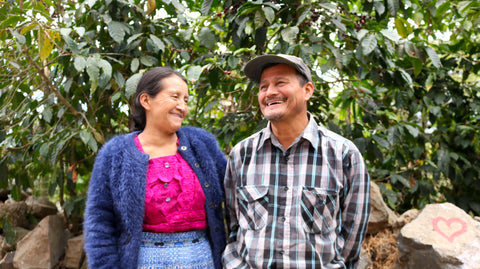Caravela is celebrating 20th birthday this year. What has been the biggest change in specialty coffee over these past two decades, and what do you think will be the biggest change over the next two?
20 years ago, coffee was, in general, just coffee. It was homogenous and most producers knew it. Imagine a producer going the extra mile to produce coffee, only for it to be bought at the same price as everyone else’s coffee. This producer would see how his artisanal product was mixed with everything that was bought, no matter the quality.
So why would they bother focusing on doing something different or better? Their work was not really appreciated, so why invest more and go further when the juice, quite literally, was not worth the squeeze?
Fast forward 20 years and the coffee industry has evolved dramatically. Now coffee roasters and consumers are demanding better quality and traceability, which means producers now have the opportunity to get paid better prices for the quality coffee they produce. Now, there is value in going the extra mile on the farm. Most producers are still price takers, but those who want to achieve higher prices at least have the opportunity and the ability to do so through developing direct relationships—the foundations on which Caravela was built. The coffee growers with whom we work have now gained a voice and emerged from anonymity and are being recognized for their hard work.
'The barriers preventing producers’ voices from being heard will be greatly diminished and the playing field will be levelled.'
As we look to the future, we will see this effect multiplied thanks to technology at the farm level. At Caravela we are investing in technology that allows producers to have better access to information and a better understanding of their product, leading to improved farm management and easier ways to communicate with the industry and consumers. The barriers preventing producers’ voices from being heard will be greatly diminished and the playing field will be levelled.
You recently released an impact report on direct trade in collaboration with Stumptown Coffee Roasters. What were the main takeaways from the results?
The independent report examined the impact since 2011 on the Colombian producer group El Jordan in Tolima of a fixed-price, long-term relationship we helped develop with Stumptown. The results were very positive, while highlighting some areas to improve, which we’re working on. To assess the impact of the relationship, information was collected from the El Jordan group and a control group that sells coffee in the open market. The difference between these two groups was staggering: the El Jordan group said they saw coffee production as a profitable enterprise, while the control group stated the opposite. In fact, the control group was very pessimistic about coffee production, with many diversifying away from coffee. This was also seen in terms of satisfaction, with the El Jordan group feeling much more enthusiastic about producing coffee, meaning they were more likely to invest in their farms, in turn allowing them to improve their quality and prices.

The report is proof that having fixed prices and a guaranteed purchased quantity over a long-term period is a game changer for small-scale producers. It removes the uncertainty and volatility, minimizes risk, and allows them to budget, invest, and look towards the future.
How has Covid-19 affected producers, and what are you doing as a green coffee importer to help?
The Covid crisis has had varying impacts throughout Latin America due to harvest seasonality. Central America and Mexico had basically finished their harvesting when the pandemic was starting, meaning most producers had sold the majority of their coffee. Because of the lockdowns and mobility restrictions instituted by governments and communities, these producers have struggled to get inputs and financing and thus are more worried about the effect the pandemic might have on the 2021 harvest.

For South American origins, however, the pandemic coincided with the start of the harvest, as governments imposed strict lockdowns in coffee producing regions. Finding pickers became extremely difficult, as workers were not allowed in communities other than their own. Communities however united and helped each other out. In many towns the mayors provided transportation for people from the town, allowing them to get to the farms and pick coffee. Some communities settled a base price per kilogram of cherry picked to standardize and incentivize people to work. Villages shared pickers according to how the harvest was progressing, giving priority to the farms that needed help most urgently. Picking coffee became a solution for those that had lost their jobs or closed their shops in the towns. These strategies, along with the implementation of strict biosafety protocols in coffee farms, allowed cherries to be picked, and so far, the harvest has progressed without major disruptions and no significant spread of Covid-19.
Thankfully, we have a resilient business model that is built on long-standing relationships with most of the producers who sell to us, as well as the roasters who buy from us. Since the vast majority of the roasters we work with sign forward contracts, this has allowed us to continue buying coffee from our producer partners. At this point we expect to buy almost the same amount of coffee in 2020 as we did last year.
'Communities however united and helped each other out.'
Another aspect that has benefitted us during the pandemic is the fact that our purchasing model is decentralized. This means that we have a purchasing point, a QC Analyst and PECA technician in almost every town where we buy coffee. We don’t have to travel to select coffees from cooperatives or groups as we are already on the ground, so producers can deliver their coffees straight into their local purchasing station. The mutual trust that we have with our producer partners means that even if they cannot deliver their coffee in person, they know that we will pay them correctly. And despite the strict movement restrictions in place, the fact that coffee is considered an essential product in all the countries where we operate means we haven’t faced significant challenges with our supply chain.
Our purchasing points and dry mills have remained open throughout the last five months, of course with enhanced protocols. We have even managed to coordinate the transport of coffee to our purchasing points without producers having to go to town. For example, in Colombia pickup trucks are going to the farms to bring the coffee down to our purchasing stations, while in Peru we have community leaders who help us centralize the coffee in the villages so we can prepare and organize transportation to our warehouses. In some regions in Ecuador there is a joint effort: the producer will move the coffee halfway and we will pick it up and bring it to our purchasing station. And we have always paid producers via wire transfers to bank accounts, so our producer partners don’t have to deal with cash, scramble at the last minute to get paid or worry about going to town. Our purchasing system automatically sends them text messages informing them about their deliveries and when they are paid into their bank accounts.
In addition, market prices have been better this year than in 2019, thanks to a strong C-market, high differentials and, in some countries, currency depreciations. So, despite some bleak predictions at the beginning of the pandemic, the situation has thankfully been much better than we initially thought.
Perhaps the biggest challenge has been on the technical assistance/education front, as our PECA team cannot visit farms as usual. We’ve shifted to providing remote assistance, which has its limits as we cannot see what is happening on the farms. Fortunately, we were already working on Arabica, a smartphone app to help producers with farm management, which we released in July. When Covid hit, we decided to include a function in Arabica to provide technical assistance by chat and will also be including e-learning modules as well.
All things considered, we are optimistic about the future. Producers have adapted well to the new reality; we were well positioned before the pandemic, which has allowed us to continue buying coffee at the same pace as last year, and demand for high quality coffee has remained strong. This means that our producer and roaster partners should come out stronger after all this is over.
This article is proudly published in partnership with Caravela.





